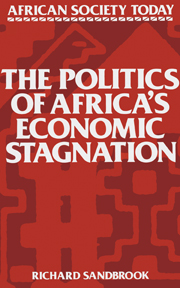Book contents
- Frontmatter
- Contents
- List of tables
- Acknowledgements
- Glossary
- Map: African states and principal cities
- 1 Disappointments of independence
- 2 Why capitalism fails
- 3 Colonial roots of the contemporary crisis
- 4 Class, tribe and politics
- 5 Anatomy of personal rule
- 6 The downward spiral
- 7 Survival strategies
- Notes
- Guide to further reading
- Index
- Farm Labour
2 - Why capitalism fails
Published online by Cambridge University Press: 01 June 2011
- Frontmatter
- Contents
- List of tables
- Acknowledgements
- Glossary
- Map: African states and principal cities
- 1 Disappointments of independence
- 2 Why capitalism fails
- 3 Colonial roots of the contemporary crisis
- 4 Class, tribe and politics
- 5 Anatomy of personal rule
- 6 The downward spiral
- 7 Survival strategies
- Notes
- Guide to further reading
- Index
- Farm Labour
Summary
The obstacles confronting capitalism in Africa are major. Some believe these roadblocks are external in origin. A popular neo-Marxian thesis of the late 1960s and seventies attributed African underdevelopment to that continent's role in the world capitalist economy. This ‘dependency’ view contends that the international system spurred the advancement of imperialist centres at the expense of the underdeveloped periphery. This is denied by others, including certain Marxists, who emphasize internal problems: inappropriate attitudes, lack of skilled manpower, unavailability of local capital, scarce natural resources, overpopulation, mismanagement of public resources, and so on.
In fact, both camps have a point. Yet rarely is either set of obstacles an impervious barrier to growth. Capitalism everywhere, including in Western Europe, has encountered obstructions. It is the task of creative political leadership to find ways around these. Unfortunately, the political life of tropical Africa usually discourages such a creative role. Too often, political elites fail to foster capitalist development and even inadvertently discourage it.
Internal impediments to growth are often major. The fact is that the raw economic potential of many African countries is negligible. It's not simply a matter of scarce natural resources – arable land, energy sources and mineral deposits. After all, such meagerly endowed countries as nineteenth-century Japan and contemporary South Korea, Singapore and Hong Kong have overcome these impediments and attained remarkable industrial growth.
- Type
- Chapter
- Information
- The Politics of Africa's Economic Stagnation , pp. 14 - 41Publisher: Cambridge University PressPrint publication year: 1985

